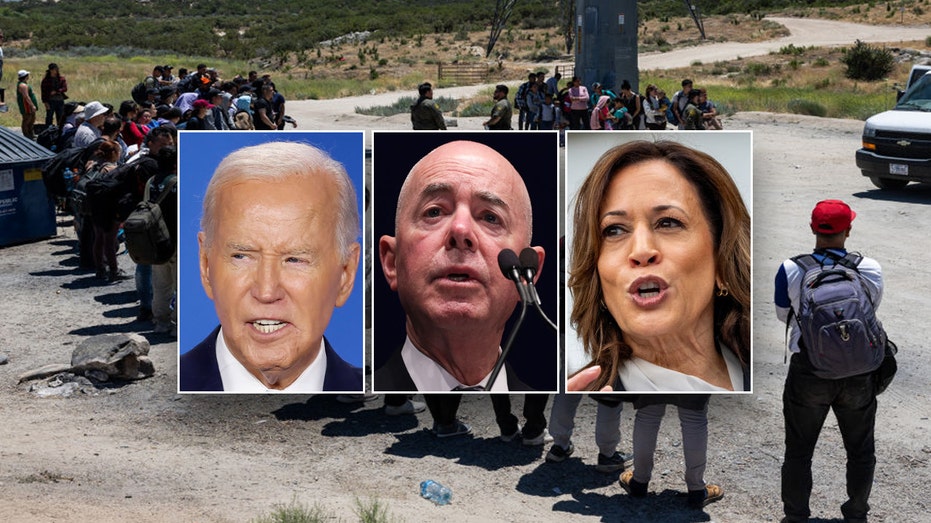
The Biden administration is believed to be preparing for a migrant surge at the southern border in the days leading up to the incoming Trump administration, according to a report.
The Biden administration is reportedly preparing for a potential migrant surge at the southern border ahead of a looming Trump administration amid concerns that migrants may seek to flood into the U.S. before President-elect Trump enacts strict border controls.
Numbers have dropped dramatically at the southern border since June after a more than three-year historic surge that overwhelmed officials and communities across the country. Trump’s presidential election victory on Tuesday brings the prospect of much tougher border measures and a mass deportation operation.
NBC News reports that on Monday, before the election, DHS Secretary Alejandro Mayorkas held a virtual meeting with top advisers and the heads of DHS agencies. In that meeting, officials raised concerns about what a Trump victory might mean for the border.
‘LIBERATION DAY’: WHAT TO EXPECT FROM PRESIDENT-ELECT TRUMP ON BORDER SECURITY, IMMIGRATION
The report said that officials asked if DHS officials were prepared for a possible spike in immigration, with immigrants preparing to enter the country at the last minute.
Migrants would unlikely be motivated by the prospect of a Trump administration, where there have been promises of historic deportations and a crackdown on sanctuary cities, but would instead be motivated by an effort to take advantage of what may be lighter border security than what they believe will be in place under the Republican administration.
DHS did not respond to a request for comment from Fox News Digital. But there are concerns that have been echoed by some conservatives who believe there could be a surge leading up to January.
“It’s going to be a rush to the border,” Lora Ries, director of the Heritage Foundation’s Border Security and Immigration Center, told Fox News Digital. “I’m sure Mexico has stepped out of the way [now] that the election is over, feeling their obligation to try and help Kamala Harris win the election is finished.”
Trump has promised to implement additional limits on the border, which includes ending the use of the CBP One app to bring in hundreds of thousands of migrants via humanitarian parole at ports of entry. He has also promised to build additional border wall to the more than 450 miles he built during his first administration.
He has also promised to launch the “largest domestic deportation operation in American history” to deport millions of illegal immigrants.
HOW HARRIS WAS DOGGED BY ‘BORDER CZAR’ LABEL, PAST RADICAL IMMIGRATION VIEWS DURING FAILED CAMPAIGN
Ries said that any surge will be fueled by migrant smugglers looking for business.
“The cartels and the smugglers are spreading the word that now’s the time to get in before Trump enters,” she said. “They will use any marketing that they can at any time to make more money.”
Republicans have also called for a tighter use of Temporary Protected Status, which grants foreign nationals from certain countries protection from deportation and work permits if it is deemed unsafe for them to return.
CLICK HERE FOR MORE COVERAGE OF THE BORDER SECURITY CRISIS
Other Trump-era policies that could come back include a form of the Remain in Mexico policy, which saw migrants stay in Mexico while they wait for their asylum cases to be heard, and travel bans from countries deemed to be national security threats.
In the last week, Trump also raised the possibility of a tariff on Mexican goods to force Mexico to get tighter control of the numbers coming north.
“I’m going to inform [the Mexican president] on day one or sooner that if they don’t stop this onslaught of criminals and drugs coming into our country, I’m going to immediately impose a 25% tariff on everything they send into the United States of America,” he said.
Ries said the looming restrictions will deter some migrants, but not all of them.
“A lot will take their shot because over the decades they’ve seen that if they generally fly below the radar once in the U.S., their chance of being encountered and removed is quite low. But for some, they’ll decide: ‘I’m not going to spend my money, I’m not going to sell my house and do this.'”




